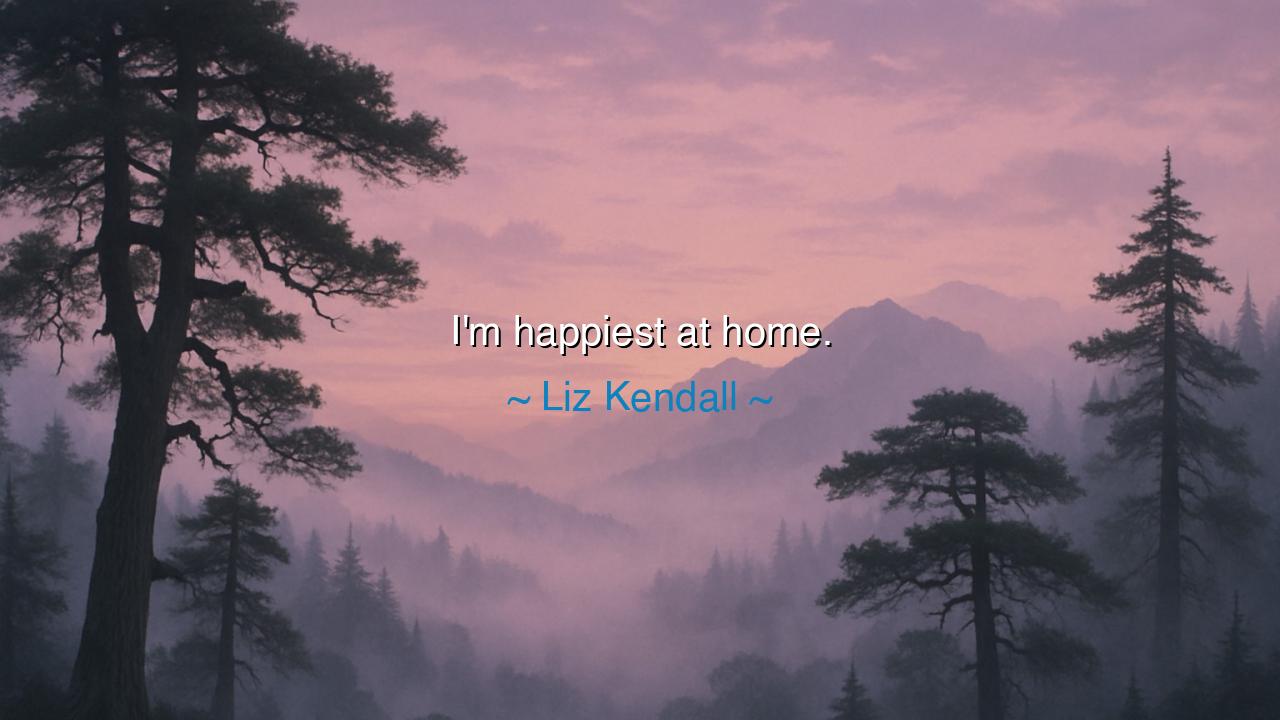
I'm happiest at home.






In the quiet simplicity of the words, “I’m happiest at home,” spoken by Liz Kendall, there rests a truth older than kings and older still than the written word. For before cities rose and empires fell, before men learned to cross seas or shape the stars into meaning, there was the home—the sacred hearth where the fire burned, not only to warm the body, but to keep alive the soul. To say, “I’m happiest at home,” is not to speak of walls and roofs, but of belonging, of peace, of the place where one’s spirit finds rest amidst the storms of the world. It is a declaration of humility, of wisdom, and of an ancient understanding: that joy is not found in conquest or applause, but in stillness.
Many chase the false fires of the world—ambition, wealth, recognition—believing that happiness must be hunted across mountains or earned in the noise of the crowd. Yet, as the elders of Athens once said, “He who conquers himself has conquered the world.” Home, then, is not only a physical dwelling; it is the realm of the self mastered. Liz Kendall’s words echo the wisdom of the philosophers and poets: that to be truly content, one must find harmony within the walls of one’s own being. For what is a palace without peace? What is travel without return? Happiness untethered from home becomes like a bird that forgets its nest—it may fly high, but it will always long for return.
In the chronicles of old, we find the tale of Cincinnatus, the Roman farmer who was called from his plow to lead the republic in its time of peril. He took up command, won victory, and then—while others would have seized power—he laid down his sword and returned to his fields. The Senate offered him glory, but he desired only the simplicity of home. And so history remembers not only his triumph, but his contentment. For in returning to the quiet life, he showed that greatness is not measured by crowns, but by the peace a man holds in his own heart. Such is the spirit of Kendall’s words: the strength to find joy in simplicity, and the courage to turn away from the noise of the world.
There is, too, something deeply human in this confession of happiness. To be happiest at home is to admit that love—more than power or praise—is the wellspring of joy. The laughter of family, the comfort of familiar walls, the silence that holds rather than empties—these are treasures that no market can sell. Home is where we are free to be unadorned, to drop the armor we wear before the world. It is where the soul stretches its limbs and breathes deeply. In this age of constant striving, Kendall’s words are a call to return—to remember that contentment is not smallness, but strength.
Yet, one must not mistake stillness for stagnation. The ancients knew that to be at home did not mean to hide from the world. The Stoics taught that peace of heart allows one to face life’s duties with calm. To be happiest at home means to carry that sense of belonging wherever one walks. The true home is both a place and a state of being—it is the inner temple that no storm can touch. Build it well, and you shall walk the earth in quiet power. Neglect it, and no palace will bring rest to your soul.
From these reflections arises a lesson: seek not the distant treasure before you have honored the one at your doorstep. Let your home—both your dwelling and your inner life—be ordered, warm, and honest. Fill it not with excess, but with meaning. Speak gently to those you live with; create beauty where you stand. If you cannot find peace there, you will not find it anywhere. The world’s applause fades quickly, but the comfort of a familiar chair and the embrace of love endure.
So, my child of tomorrow, remember this truth: the wise find happiness not in the vastness of the world, but in the nearness of their hearth. Build your home as the ancients built their temples—with reverence and care. Let it be the sanctuary of your heart, the mirror of your soul. And when the world tempts you with glittering paths, recall Liz Kendall’s simple wisdom, spoken with the quiet authority of the ages: “I’m happiest at home.” For in those few words lies the greatest of human victories—the triumph of peace over chaos, and the eternal return of the heart to itself.






AAdministratorAdministrator
Welcome, honored guests. Please leave a comment, we will respond soon